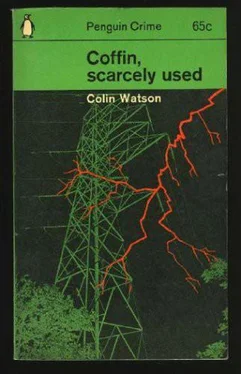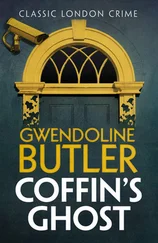Which was fortunate, for the sergeant was no adept at self-effacing observation. When he wished to see without being seen, he adopted an air of nonchalance so extravagant that people followed him in expectation of his throwing handfuls of pound notes in the air.
He had got up much earlier than his quarry, and by six o’clock was posted, already shaved, washed and hastily fed, behind his sister’s lace curtains, staring at the dark shape opposite, within which still slumbered the alderman and his family. It was not until nearly four hours later that signs of activity prompted him to go out into the cold and pretend to tinker under the bonnet of the police car, which he had left ready to drive out of the gate.
Alderman Leadbitter’s car appeared at half-past ten and was driven slowly by its owner to his office in Pipeclay Lane, near the slaughterhouses. After some twenty minutes, he walked out of the office and passed Love, seated in his car which he had parked very wrongfully opposite a cattle unloading bay.
The sergeant followed him on foot and was led to the Golden Keys Hotel. There, he drank slowly and without much enjoyment two half pints of mild while the alderman swallowed six glasses of bottled beer at the opposite end of the long saloon bar in the company of several other civic luminaries before returning to his counting house at nearly one o’clock.
Leadbitter went home for his lunch, so Love’s sister served her brother with a meal on the bamboo table in the front room. He ate speedily and with a constant eye on the opposite door, so that when he resumed the trail he was suffering the handicap of hic-cups.
The afternoon proved no more eventful than the morning. By the time the alderman’s car drew up at his home for the second time that day, Love was wondering why he had wasted so many hours in dull and fruitless surveillance instead of relying on Leadbitter being a man of regular and proper habits that included taking five-o’clock tea in the bosom of his family.
Later still, when it was quite dark and he sat in the cold car, drawing what comfort he could from a cigarette, he was gradually overtaken by a sense of anticlimax.
Suppose the alderman and the other people who had replied to the advertisements really were buyers of old odds and ends? The things might be genuine and a seemingly eccentric way of disposing of them might be the method of doing business chosen by some exclusive private dealer. Yet surely that standardized eight pounds deposit was too fantastic a condition of sale to be acceptable even to someone mad enough to want a—what was it again?—a Japanese newel post.
A tankard it was for Leadbitter. A pewter antique tankard, he’d said.
Love repeated the phrase to himself several times. Then he realized why it had struck him as odd from the first. The order of words was queer.
Any normal person surely would have written antique pewter tankard. Or, in catalogue and army style, Tankard, antique pewter. But never pewter antique tankard. Why had the words been put in that sequence?”
Again Love allowed his fancy to stray outside the local probabilities. He considered codes. Pewter...Antique...Tankard... It couldn’t be a letter by letter code. That kind did not form actual words. In any case, it would be expecting far too much of people like Flaxborough’s successful business men to grasp anything so complicated.
Could each word have some prearranged significance, then? That was more probably the explanation. If it were, there was no hope of finding the meaning of the advertisements by ordinary systems of de-coding—even if he knew what these were, which he didn’t, except for a vague idea that the most frequently recurring symbol would represent E, and what was the use of a string of E’s, anyway?
Right, then, ruminated Love, each of the three words meant something quite different. Pewter?—cocaine, perhaps. Antique? The quantity, say. And tankard? There was only one factor left for that to represent—the price asked. “Please have ready for me at 8.15 p.m. two pounds of your best cocaine at...at...fifteen and six an ounce.” How cold and cramped he was growing. Damn Purbright and Leadbitter and tankards and codes and...He sat up and peered through the windscreen. At last, the alderman’s door was opening.
Five minutes later, Love drew up at a discreet distance from Leadbitter’s car in the forecourt of the Golden Keys. Leadbitter was not in search of the saloon company this time. He hurried into a small room on the other side of the corridor.
Love lingered near the entrance. It was not yet eight o’clock, and although he felt confident that Leadbitter had not noticed his pursuit up to now, he did not want to commit himself to an encounter at close quarters until the last possible moment. Regretfully he watched a waitress carry what appeared to be a whisky into the room Leadbitter had entered, then he retraced his steps to the car.
To the policeman’s considerable relief, Leadbitter soon reappeared. Instead of getting into the car again, however, he set off along Hooper Rise and turned right into Spoongate. Love followed, keeping to the opposite pavement. For the first time that day, the alderman appeared slightly apprehensive. He even glanced back on several occasions, but saw nothing to make him reduce his pace.
Suddenly, Love realized that the other was no longer in front. He halted, momentarily panic-stricken, and stared over the road at the point where Leadbitter had vanished.
Dark, pillared doorways faced him, all much alike in the gloom. There was no sound but that of a wireless on one of the upper floors. He remained motionless, straining eye and ear.
Then from one of the porches came a shaft of yellow light. Love mentally fixed its position and was already walking diagonally across the road towards it when it narrowed to a slit and was eclipsed altogether. A gentle thud and the reappearance of the light, widening and narrowing by turn, told Love that the door which almost certainly had admitted Leadbitter had been left on the latch and was swinging in the light wind.
Love walked cautiously up the four steps that led to the doorway. On one side he saw the gleam of metal. It was a name plate. He stooped and tried to read it, but the nearest street lamp was thirty yards away. Just as he was fumbling for matches, the door swung back and a woman stepped out into the porch. Love straightened up guiltily and looked at her. “It’s all right,” she said. “They’ve started.” “Oh,” said Love, “thank you.” The woman wished him good night and descended the steps. Now that the door was wide open, the name on the plate was perfectly clear. It was R. Hillyard, M.D.
The panelled hallway into which Love stepped, closing the door gently behind him, had once been warmly luxurious, but the constant passage of patients had given it a shabby, polish-starved look. The elegance of its proportions still made immediate impression, however, and Love glanced admiringly at the slim-bannistered staircase and the lofty window at its head. The house was a much larger one than the narrow façade suggested.
The nearest door on the right was ajar. Love heard from the room beyond an occasional sniff, a cough or two and an assortment of shuffles and creaks. It was without doubt the doctor’s waiting-room. He entered, sat down as near the door as he could manage, and after the preliminary devotions usual in such places—brief contemplation of his knees and a slow search round the walls for a non-existent clock—he surreptitiously looked over the eight or nine people present.
They were a typical surgery selection. A young woman who met his glance with a resentful stare, signifying that she held the male species malignantly responsible for all abdominal irregularities whatsoever. A sunken-cheeked man with scrubby grey hair and an internal whistle. A middle-aged matron with Bad Leg. A nervous young man who had been reading too many truss advertisements.
Читать дальше












